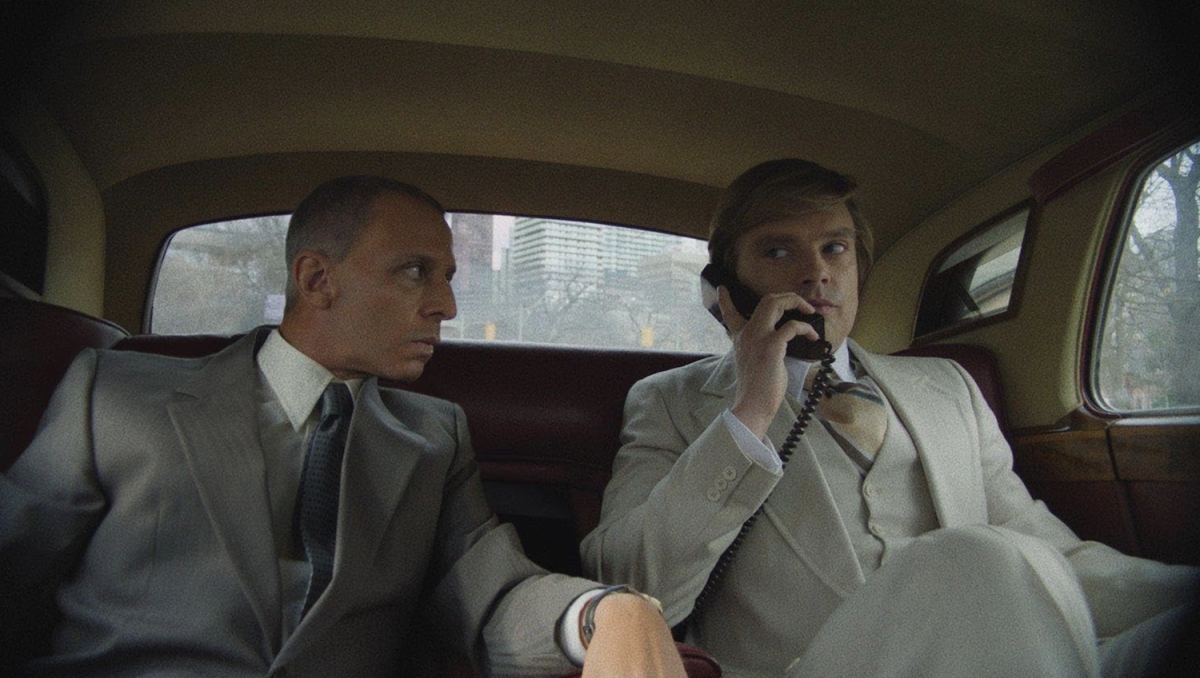Content warning: This review contains mentions of sexual assault.
It seems impossible to think of Donald Trump as a young, somewhat reserved and shy-to-ambition businessman — but that’s how Ali Abbasi’s newest film “The Apprentice” opens. The year is 1973, and Trump (Sebastian Stan) is taking prominent business tycoons out for meals at a dinner club. There, he catches sight of a menacing yet alluring man, and is sucked into the world of lawyer Roy Cohn (Jeremy Strong), kickstarting his quest to becoming an American success story.
While many young Americans know Trump solely from his tenure as the 45th president of the United States, Abbasi chronicles the lesser-known timeline of his relationship with Cohn, the prosecutor who shaped Trump into the controlling and cutthroat dealmaker he is today. Cohn, played by a transformative Strong, was infamously known for assisting Senator Joseph McCarthy’s investigations of communists in the United States. With one threatening stare, he takes a young Trump under his wing.
While Trump is shown managing his father’s dingy Trump Village real estate, he expresses a desire to pursue bigger and better business ventures. The starting point is taking over the Commodore Hotel and upgrading it under his own name. Cohn immediately jumps at the opportunity to push Trump to become more ruthless, helping him skirt around legal troubles like his discriminatory housing lawsuit and instilling an ethos of manipulation. “You have to be willing to do anything to anyone to win,” Cohn states. While the film chronicles one of the biggest American success stories, it ultimately illustrates a horrifying descent into capitalist greed and cruelty.
As Trump is made more successful by each economic gain, his hubris and self-absorption become even more apparent. He meets and marries Ivana Zelníčková in 1977, but even after multiple children, he uses her as a doll and forces her to get multiple cosmetic procedures before claiming he was never attracted to her in the first place. He abandons his humanity in favor of his business as he bends to Cohn’s will, even distancing himself from his family — his brother Fred died from alcoholism while Trump rejected his pleas for help. Trump’s power reaches its peak with the grand opening of Trump Tower in 1983, yet it is also his socially weakest point. The tone of the film becomes increasingly horrifying as Trump sexually assaults Ivana, high on a power trip atop his gilded throne. With the influence he now holds, he becomes more self-centered and rejects Cohn’s advances — his once cunning legal advice is now old and tired. The apprentice is now the master.
Abbasi portrays New York City as the gritty center of power, crime and manipulation — the perfect environment for Trump’s ascent to the top. Through shaky and grainy cinematography that emphasizes the flashy and sleazy nature of the city, he creates a character out of the setting, establishing it as another factor in the transformation of the conman.
What makes “The Apprentice” so great is how it plays off caricature rather than biography. The film feels gruesome at times, as the audience learns how sociopathic and emotionless its two leads are. Trump’s greed fosters a sense of uneasiness as he begins to morph into the figurehead known today. One grim sequence details Trump graphically as he gets weight and scalp reduction surgery — a desperate attempt at controlling his increasingly decrepit figure. In this sense, he goes literally and figuratively under the knife, turning into the face of his empire rather than a real person capable of emotion. While his demise is anything but imminent, Cohn announces he has liver cancer — a measly cover-up for his actual AIDS diagnosis — as his influence over the corporate and legal world declines. His once-menacing figure is almost unrecognizable as he is relegated to a wheelchair, resembling a living corpse. Strong is especially magnetic here in his performance, and his face says it all as the reality of Trump’s disregard for him comes to fruition, a horrifying realization to witness.
The choice to not fully unleash the Trump persona — the hand jabs, the pursed lips, the interjections like “nasty” or “loser” — until the tail end of the film allows the audience to see the full transformation of a man who began a quest for the American dream, and in turn, became rotted by gluttony and self-image. While the film captures a moment in time, an unfinished narrative, it chronicles a horrifying descent built on corporate greed and narcissism.
Contact Maggie Turner at [email protected].

























































































































































